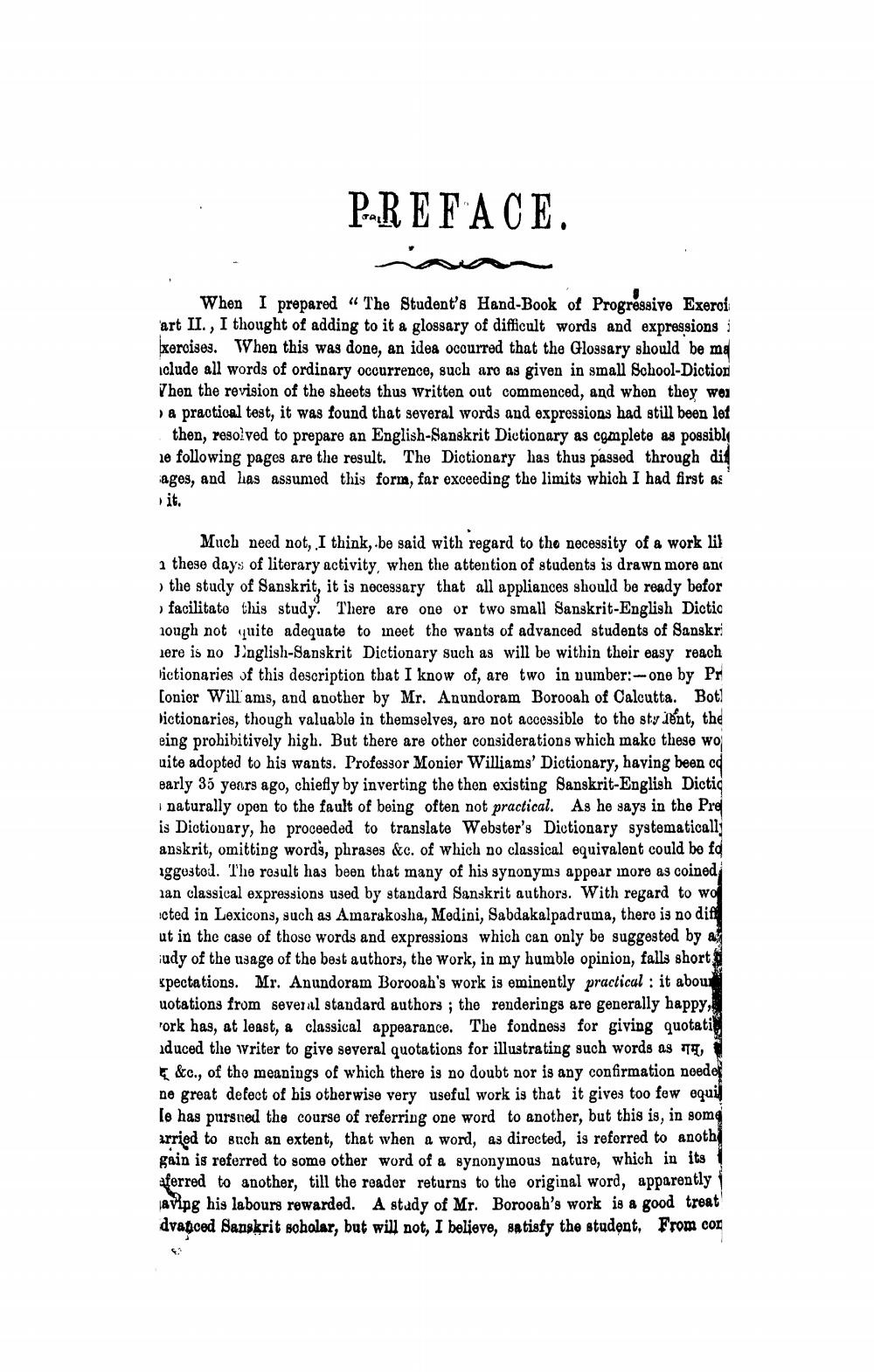Book Title: English Sanskrit Dictionary Author(s): Vaman Shivram Apte Publisher: Radhabai Atmaram Sagoon View full book textPage 6
________________ PREFACE. When I prepared « The Student's Hand-Book of Progressive Exeroi art II. , I thought of adding to it a glossary of difficult words and expressions i xercises. When this was done, an idea occurred that the Glossary should be me Iclude all words of ordinary occurrence, such are as given in small School-Diction Then the revision of the sheets thus written out commenced, and when they wou > a practical test, it was found that several words and expressions had still been lef then, resolved to prepare an English-Sanskrit Dictionary as complete as possible he following pages are the result. The Dictionary has thus passed through dit ages, and has assumed this form, far exceeding the limits which I had first as it. Much need not, I think, be said with regard to the necessity of a work li} 1 these days of literary activity, when the attention of students is drawn more an, the study of Sanskrit, it is necessary that all appliances should be ready befor facilitate this study. There are one or two small Sanskrit-English Dictic hough not quite adequate to meet the wants of advanced students of Sanskri iere is no Inglish-Sanskrit Dictionary such as will be within their easy reach lictionaries of this description that I know of, are two in number:--one by Pr Conior Williams, and another by Mr. Anundoram Borooah of Calcutta. Bot! lictionaries, though valuable in themselves, are not accessible to the stylént, the eing prohibitively high. But there are other considerations which make these wo uite adopted to his wants. Professor Monier Williams' Dictionary, having been cd early 35 years ago, chiefly by inverting the then existing Sanskrit-English Dictid i naturally open to the fault of being often not practical. As he says in the Pre is Dictionary, he proceeded to translate Webster's Dictionary systematically anskrit, omitting words, phrases &c. of which no classical equivalent could be fo iggestod. The result has been that many of his synonyms appear more as coined ian classical expressions used by standard Sanskrit authors. With regard to wo cted in Lexicons, such as Amarakosha, Medini, Sabdakalpadruma, there is no difi ut in the case of those words and expressions which can only be suggested by a iudy of the usage of the best authors, the work, in my humble opinion, falls short xpectations. Mr. Anundoram Borooah's work is eminently practical : it about uotations from several standard authors; the renderings are generally happy, York has, at least, a classical appearance. The fondness for giving quotati aduced the writer to give several quotations for illustrating such words as ta, &c., of the meanings of which there is no doubt nor is any confirmation neede ne great defect of his otherwise very useful work is that it gives too few equil le has pursued the course of referring one word to another, but this is, in some arried to such an extent, that when a word, as directed, is referred to anoth gain is referred to some other word of a synonymous nature, which in its ! aferred to another, till the reader returns to the original word, apparently 1 laving his labours rewarded. A study of Mr. Borooah's work is a good treat! dvatced Sanskrit sohalar, but will not, I believe, satisfy the student. From conPage Navigation
1 ... 4 5 6 7 8 9 10 11 12 13 14 15 16 17 18 19 20 21 22 23 24 25 26 27 28 29 30 31 32 33 34 35 36 37 38 39 40 41 42 43 44 45 46 47 48 49 50 51 52 53 54 55 56 57 58 59 60 61 62 ... 474
